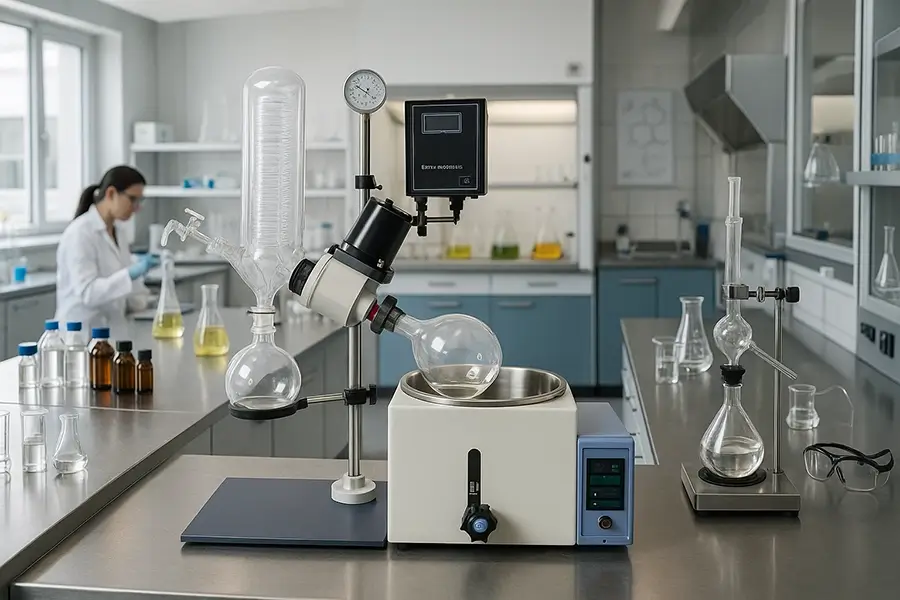You're working late in the lab again, staring at that beaker of used acetonitrile. You know this expensive solvent deserves a second life, but how? What if I told you that the right rotary evaporator could make solvent recovery not just possible, but remarkably efficient?
Why Acetonitrile Matters
Let's talk about the star of the show: acetonitrile (CH₃CN). This polar solvent is a lab superstar - it plays critical roles in analytical chemistry, pharmaceutical manufacturing, and chemical synthesis. With a boiling point of 82°C and polar characteristics, it's perfect for HPLC separations and as a reaction medium.
The answer boils down to two factors: economics and safety. Acetonitrile isn't cheap - prices range from $80 to $200 per liter depending on purity and volume. Considering research labs often consume hundreds of liters monthly, these expenses skyrocket quickly.
Average recovery rate of acetonitrile using rotary evaporators
Cost savings achieved through solvent recycling programs
Typical payback period for rotovap investments in solvent recovery
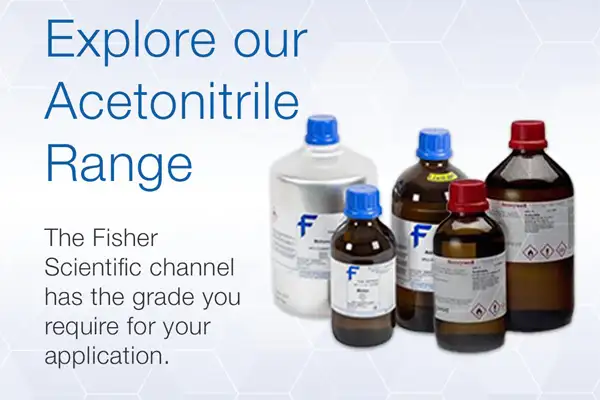
Additionally, acetonitrile carries significant environmental and safety concerns. It's classified as:
Flammable (Class IB liquid) - Flash point: 6°C (42.8°F)
Toxic - Harmful if swallowed, inhaled, or absorbed through skin
Environmental hazard - Bioaccumulation potential in aquatic life
With disposal costs ranging from $5 to $20 per gallon depending on local regulations, recovery isn't just eco-friendly—it's economically essential.
Rotary Evaporators: Your Solvent Recovery Workhorse
A rotary evaporator (rotovap) is a specialized instrument designed for the efficient, gentle removal of solvents from chemical samples. Through a brilliant combination of reduced pressure and controlled heating, rotovaps allow solvents to evaporate at significantly lower temperatures than their normal boiling points.
The Acetonitrile Advantage
Why are rotovaps uniquely suited for acetonitrile recovery?
Low Temperature Operation
At 150 mbar of vacuum, acetonitrile evaporates at just 27°C - well below its standard 82°C boiling point. This prevents degradation of heat-sensitive materials.
Unbeatable Efficiency
Modern rotovaps achieve 85-95% solvent recovery rates with proper configuration.
Closed System Safety
Rotovaps are completely sealed systems, minimizing operator exposure to toxic vapors.
Rotovap Efficiency Metrics
Acetonitrile Recovery Rate: 85-95%
Time per Liter: 20-40 minutes
Purity of Recovered Solvent: ≥99.5%
Payback Period: 6-18 months
The math is compelling. According to a MIT Environmental Solutions Initiative study, labs implementing proper solvent recovery systems save an average of $25,000 annually in chemical purchase costs alone. When you factor in reduced disposal fees and regulatory compliance savings, the total economic benefit climbs substantially.
Choosing Your Ideal Rotovap Machine
Not all rotary evaporators are created equal when it comes to acetonitrile recovery. Here are the critical factors to consider:
Capacity Matters
Choose a vessel size aligned with your typical batch volumes
Vacuum System
Required depth: At least 10-20 mbar for optimal efficiency
Safety Features
Explosion-proof motors and contained vapor paths essential
| Lab Scale | Sample Volume | Recommended Rotovap | Recovery Capacity (Hourly) |
|---|---|---|---|
| Research/Pilot | <1 Liters | Small/Mini Rotary Evaporators | 0.5-1 L/hour |
| Standard Lab | 1-5 Liters | 2L-5L Rotary Evaporators | 1-2.5 L/hour |
| Pilot Production | 5-20 Liters | 5L-10L Rotary Evaporators | 2.5-5 L/hour |
| Industrial Scale | 20+ Liters | Large-Scale Rotary Evaporators | 5-15 L/hour |
Material Compatibility: Ensure glass components (especially seals) are compatible with acetonitrile. PTFE seals offer superior chemical resistance.
Automation Options: Modern rotovaps can automate lifting, rotating, and solvent detection, freeing your team for higher-value work.

The learning curve is remarkably gentle. Modern rotovaps come with intuitive digital interfaces and clearly documented rotary evaporator manuals. Most labs achieve reliable operation within one day of training. Many manufacturers offer comprehensive setup videos and remote troubleshooting - making implementation smooth even for teams new to evaporation technology.
Proven Solutions for Every Scale
After extensive testing across various lab environments, these rotary evaporator systems consistently deliver exceptional acetonitrile recovery performance.
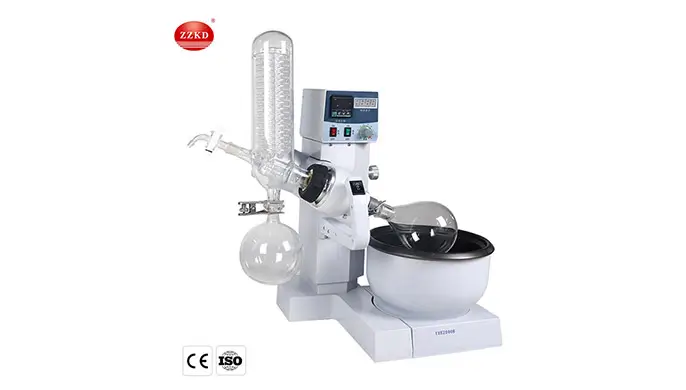
Compact Powerhouse
Ideal for space-constrained labs handling small batch sizes.
Features:
0.5-2L evaporation flasks
Integrated vacuum system
Digital temperature control
Perfect for: Research labs
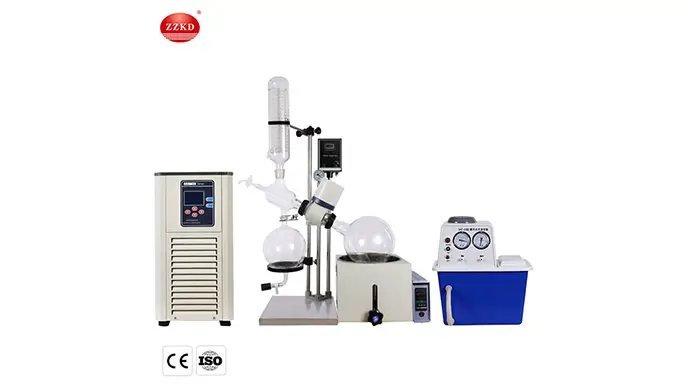
Workhorse Performance
The most versatile option for daily solvent recovery.
Features:
2-10L capacity options
Advanced vacuum control
Automatic lift mechanism
Perfect for: QC labs
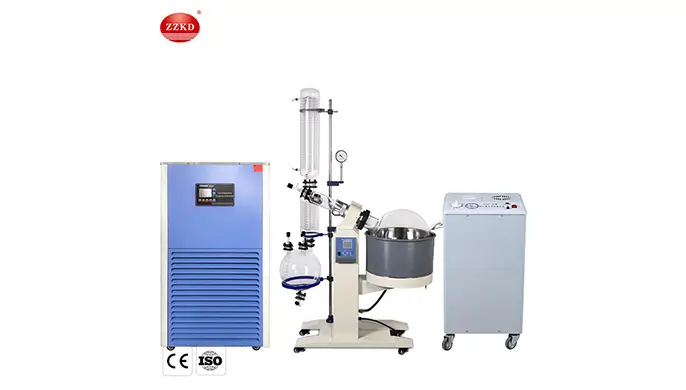
High-Capacity System
For labs requiring substantial daily solvent recycling.
Features:
20L+ capacity
Industrial-grade motor
Automated solvent collection
Perfect for: Pilot plants
Saving Money Is The Last Word, And It Is Worth Investing In Buying!
Consider this: The average research lab spends $8,000-$15,000 annually on acetonitrile alone. With proper recovery, implementing a rotary evaporator system typically delivers full ROI within


